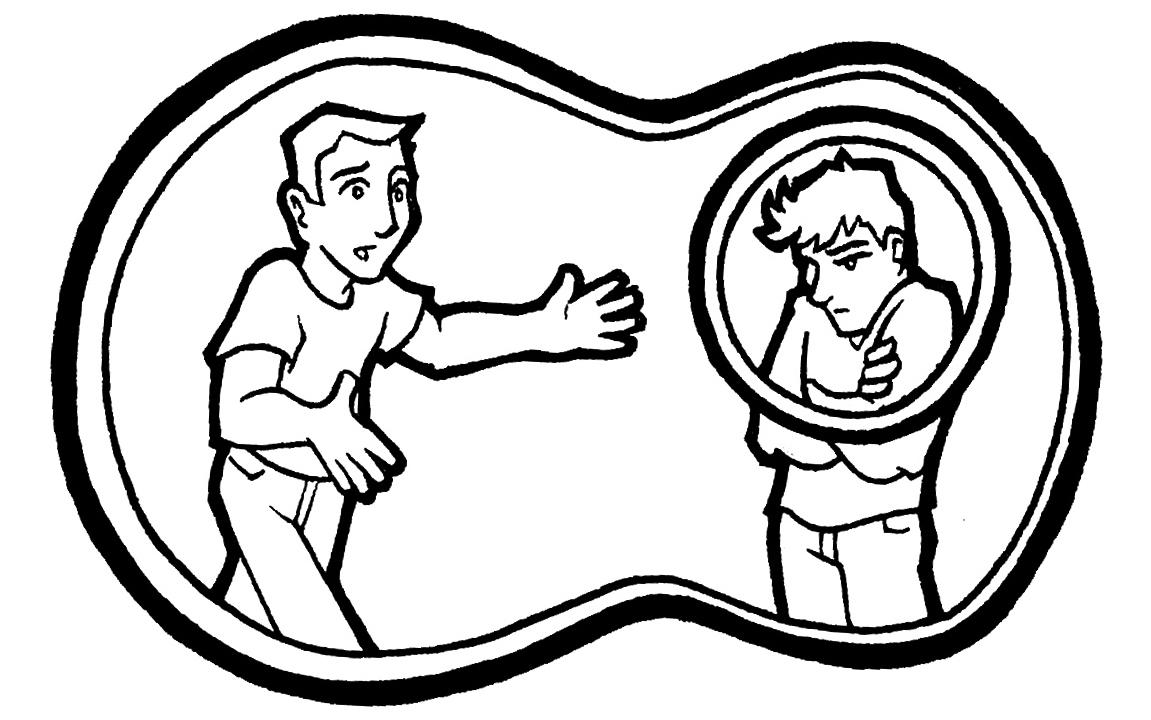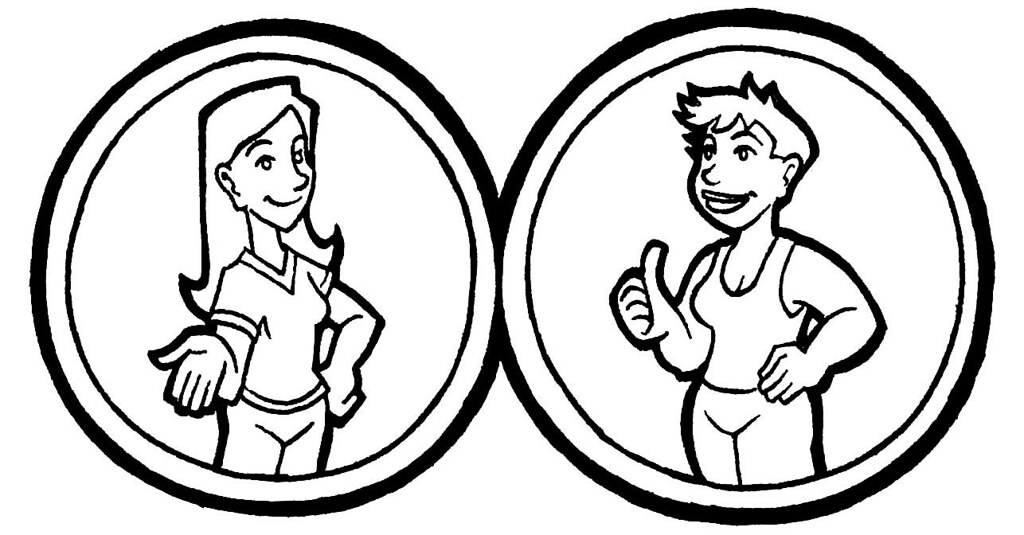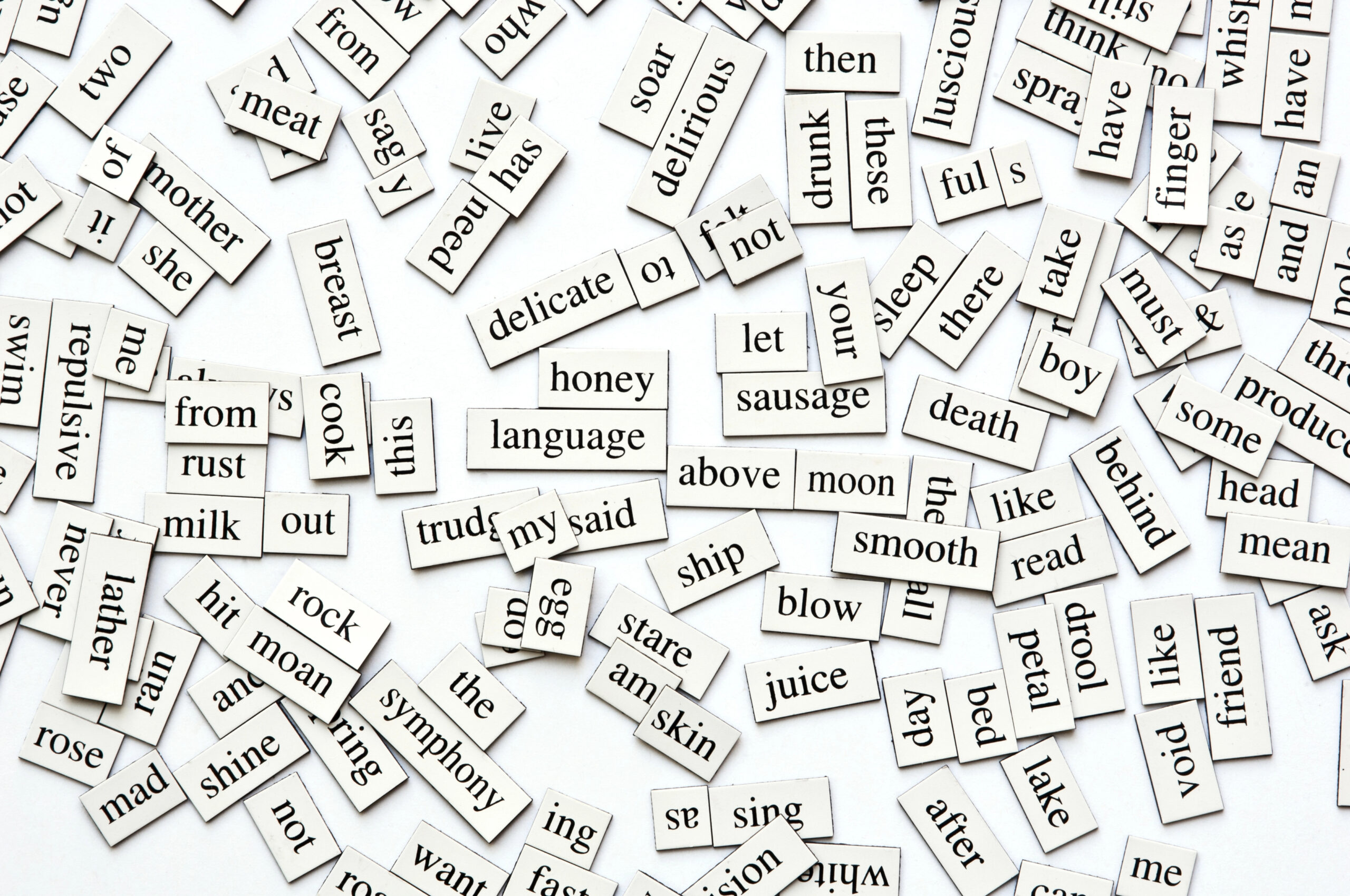 This is a guest post from Pace Smith, the co-leader of the Connection Revolution. Pace teaches idealists how to change the world through connection. She speaks, writes, and teaches workshops to foster understanding, healing, empowerment, authentic communication, and personal growth. She’s happily married to Kyeli, her partner in life and in business. She loves to play Dance Dance Revolution and carries a spare spleen with her everywhere she goes.
This is a guest post from Pace Smith, the co-leader of the Connection Revolution. Pace teaches idealists how to change the world through connection. She speaks, writes, and teaches workshops to foster understanding, healing, empowerment, authentic communication, and personal growth. She’s happily married to Kyeli, her partner in life and in business. She loves to play Dance Dance Revolution and carries a spare spleen with her everywhere she goes.
“Yes or yes?” asked the man on the TV.
My friend Jessica (not her real name) got off the couch and stood up. “Yes!” she shouted back enthusiastically.
“Is she seriously talking to the TV?” I thought to myself, worried.
You see, Jessica and I were in the middle of watching T. Harv Eker’s Millionaire Mind DVD that she had brought over to share with me. She had just spent the cost of a new car on his latest coaching program, and couldn’t stop singing his praises.
I was considerably more dubious. From what I had learned about NLP (neurolinguistic programming) and cults, this “Yes or yes?” call-and-response technique was a form of brainwashing.
Was T. Harv Eker brainwashing his viewers out of their money? Or were they willingly volunteering to show up and reframe their negative beliefs about money? Or was the truth somewhere in between?
To answer this question, we’ll need to fast forward to the present day, where I’ll tell you another story — a story about Robert and Greg.
A Tale of Robert and Greg
I look to my left, and I see Robert, struggling to make a living with his acupuncture practice, charging rock-bottom rates out of fear of doing financial harm to his clients. I look to my right, and I see Greg, using every trick in the book to sell $30,000 business coaching programs to a sea of frenzied buyers.
I’m Pace. I think Robert is taking too much responsibility for his clients’ well-being, and I think Greg is taking too little.

Robert and Greg
That’s Greg on the right, taking responsibility only for himself and putting all the burden onto his clients. “I’m not going to coddle them,” Greg says. “It’s their money, and how they want to spend it is their choice.”
What if instead you took responsibility for what’s yours, and trusted your client to take responsibility for what’s theirs? What would that look like? I think it would look something like this:

This is what it looks like to be of service without rescuing.
Powerful and Compassionate. Sounds great, right? Let’s all be powerful and compassionate. I’ll sign that pledge!
But here’s the problem.
Everyone believes they’re smack dab in the middle.
Everyone believes that they’re at the perfect balance of power and compassion.
Everyone thinks that the people to their left are not powerful enough. Everyone thinks that the people to their right are not compassionate enough.
Take a moment to think of someone you believe is not compassionate enough. Pick a specific person. I’ll wait. *waits*
You know what? That person thinks that you are not powerful enough. They’re thinking, “You could do so much more good if you could get past your fear of selling.”
Take a moment to think of someone you believe is not powerful enough. Pick a specific person. I’ll wait. *waits*
You know what? That person thinks that you are not compassionate enough. They’re thinking, “I hate to say it, but you’ve kind of sold out. I’m not entirely comfortable with the methods you use.”
It’s all relative. “Compassionate” and “financial harm” mean wildly different things to different people. Good intent is not good enough.
This is where the intestines come in.
I like spicy food. You like mild food. I don’t judge you as a wimp, and you don’t judge me as an untrustworthy thrill-seeker.
It’s simply a matter of taste.

Marketing, sales, business – it’s a matter of taste too. If a chef serves food that’s too spicy for you, you don’t condemn him, you just opt out and say, “That’s not for me.”
Long sales pages may be too spicy for some, and just right for others.
Product launches may be too spicy for some, and just right for others.
Selling $30,000 coaching programs to a frenzied crowd may be too spicy for some, and just right for others.
“But wait!” you cry. “Surely that’s going too far!”
Yes. Yes, that is going too far.
The “it’s just a matter of taste” argument only applies when no harm is being done. If a chef serves food that’s so spicy it actually eats holes in your intestines, that’s not just a matter of taste, that’s wrong.

We must take a stand against what we believe to be doing intestinal (or financial) harm, while leaving room for what we believe to be a matter of taste.
But we must do it without using words like:
- “harm”
- “wrong”
- “compassionate”
- “integrity”
- “value”
because those words mean wildly different things to me and to you and to Robert and to Greg. Greg doesn’t think he’s doing financial harm; he’s simply “doing business.”
How can business owners make a pledge our customers can believe in?
We must make it concrete and specific.
We must make it objectively clear what we stand for and what we stand against.
What I Believe
I believe that saying, “Hey, I made this thing that might could help you” is mild.
I believe that long sales pages are medium.
I believe that writing eye-catching but misleading headlines is hot.
I believe that making a sale to an emotionally charged buyer without a cooldown period of at least 24 hours is poisonous.
Where do you draw the line?
What concrete, specific business practices would you label as mild, medium, hot, and poisonous?
Illustrations from The Usual Error.







19 Responses
Oh my gosh, I just love this. Amen. Huzzah. Makes so much sense to me. I’m going to ponder this one for sure. Just had to say thank you for this contribution to the conversation, Pace!
*rapturous sighs* This kind of brilliant analogy-making is only one of MANYMANY reasons I love you so much. This is precisely what I needed to hear about this whole idea (although the other two posts were also great!) right now. I’m in a stage of determining how to present my dishes; I know what I like, and I’m trying to gauge the best level of spiciness for sharing that deliciousness with other people. Right now, it’s a bit muddled, but I’m (fortunately) not destroying anyone’s intestines.
When you’re trying to figure out your menu and you’ve got a brand new restaurant, you’ve got to experiment. Try a spicy dish. Try some mild. Try some medium. See what your customers eat, and see what they come back for. A couple may dislike what they eat the first time, and they may not come back for seconds. But there will be more.
Hooray, Bravo, YippeKayay!!!
So glad I unblocked my FB block and caught this.
The money thing is eating me up (emotions can wreck havoc on the intestines too), and I am wrote about it today.
I am so the person that is not powerful enough with fear of selling.
I think that the current financial climate adds to this long instilled money issue I have. Like who am I to ask people to but things from me when unemployment is at a record high. GAH!
Ellie are you reading this 😉
BTW I wrote my money piece today as I start working out my level of spiciness.
Gwyn,
I know, that can be really hard. Here’s one idea that you might find interesting.
What if, instead of writing to (and selling to) people, you wrote to (and sold to) one person? People may be suffering from unemployment, but that one person isn’t. People may be sweating in the current financial climate, but that one person is sitting there needing the help you’re offering, and more than willing to buy it from you.
Thanks Pace,
That is a great suggestion. Lot’s to work on. Please forgive my typos and repetition too. I was so excited to see others writing on the same topic!
Oh Pace, yes. This is just the sort of thing I have been working on lately. And I think mild/medium/hot is a fantastic metaphor. Especially when you consider that in .some. cultures, people do kind of look down on you if you “can’t take the heat” and in others they quietly avoid you if you put cream and sugar in your coffee. So cultural context can challenge the idea that really, whatever you like for flavor is fine. And you might like hot food today and mild food tomorrow, too. Variety and all that. 🙂
This leaks over, too, into considering what we believe about people who have lots of money or make lots of money (whatever that means to you) and people who don’t. Instead of, “oh, the hot foodians! They are all extravagant and loud and stay up till all hours dancing!” We could just choose to say, “Oh, the hot foodians? They’re way more energetic at night than I am.” and then go home to the cabin in the woods and go to sleep. Or we could say, “well, lots of people who like hot food also like to dance late at night. I like hot food..and I like to get up really early. So I’m going to bed.”
Exactly, Leela.
For a clear example of the relativity of making lots of money, read Squeaking by on $300,000.
And I’ve got to say that I love the phrase “hot foodians”.
I believe that making a sale to an emotionally charged buyer without a cooldown period of at least 24 hours is poisonous.
You can believe that, Pace, but it doesn’t make it true. I believe that you’re making the usual error here, and here’s why: it seems like you resent being asked to buy when you’re emotionally charged, but there are buyers who only buy when they’re emotionally charged. You buy what you need and what you believe will be objectively best for you, whereas if they can’t get fired up about a product or service, they won’t touch it.
In those cases, making a sale to an emotionally-charged buyer is the only option, because if you make them wait 24 hours, they won’t buy it. They’ll have gotten excited about something else.
Moreover, by phrasing it as “I believe that X is poisonous“, you’re putting a moral value on the situation. The “I believe” doesn’t ameliorate that – people like I described above are going to read that and say “Oh, I must be shopping wrong“. And while I have trouble believing that you want anyone to feel bad about themselves or their shopping habits, nonetheless, that’s exactly the phrase that went through my mind before I stepped back and realized that I was getting emotionally charged about your words.
Please consider revising this post so that you’re not making blanket assumptions about how buyers behave, and so that your words are less damaging.
Hmm, I’m not sure whether we’re actually opposed or whether I’m not communicating my intent clearly.
I agree with you that most buyers buy for emotional reasons. What I meant was this kind of “emotionally charged”. The kind where emotions like belonging and peer pressure can lead a buyer into making a harmful decision.
I am, indeed, making a moral judgment, but I’m judging the seller, not the shopper. Can you explain to me why someone would feel bad about their shopping habits because of what I wrote?
I think perhaps it’s a matter of wording, because to me it sounds like you’re trying to dictate buyer behavior as much as seller behavior. I’ll quote again:
I believe that making a sale to an emotionally charged buyer without a cooldown period of at least 24 hours is poisonous.
“making a sale” = having the buyer purchase something you’re offering.
“emotionally charged” doesn’t carry the connotation to me that it does to you – to me, that simply says “the buyer is emotionally invested in the product or service”.
“without a cooldown period” sounds like you’re saying that the buyer needs to wait between exposure and sale.
So the meaning to the sentence, to me, is “A buyer who is emotionally invested in a product and buys it without waiting for 24 hours first is making a poisonous purchase.”
Which is a pretty gross thing to say, in my ears.
Now that you’ve explained it, I see that you mean “A seller who uses negative emotion to pressure someone into buying something in a window small enough that the buyer’s rational mind can’t analyze the situation is engaging in poisonous business tactics”, but that’s still not how the sentence reads to me.
Guilty of imprecision! Yes, I meant the non-gross version. Thanks for conversing instead of simply assuming; I appreciate that a great deal.
But, but, Noelle ~ I thought this was about the “sellers’ style”, not-so-much the “buyers’ behavior”…
I don’t read Pace as saying “Don’t accept a sale less than 24 hours after you offer the product” – rather, she’s saying “Don’t offer less than a 24-hour opportunity window”.
I think Pace, we hit “submit Comment” at the exact same moment! 😉
My mom quit going to a pushy healer/teacher a few months ago because she was feeling stifled and needed to follow her own intuition without anyone telling her what to do anymore. She knows of other people who still go to this person and they say to my mom, “Wow, you’re so brave! I don’t think I could ever speak up to this person,” or “I hope to have as much courage as you one day. In the meantime, I’ll keep going for my weekly sessions and taking her classes.” It just blows my mind because they’re the ones paying this person! They should be in charge of their own lives and decide who they see and don’t see! Not to mention, this person is always creating class after class after class, teaching certain modalities in half the recommended (or even required) time and charging WAY more too, and pressuring people to take them, or saying things like, “You are ready for this class” or “You need to come see me every week for at least a year and then you’ll have learned what you need,” like she’s a wise guru. When you feel it requires bravery and courage to stop seeing and paying big bucks to someone for something that should be benefitting you and empowering you… that’s definitely intestinal harm, in my opinion.
*nods* It sounds like this healer/teacher could use some more awareness and respect of the leadership dynamic that is created between the healer and client.
Lovely!
I so believe that one of the great challenges in the world of “transformation” is that we use the same words to mean different things, and navigating precisely what we mean takes more time and energy than some folks want to invest.
I agree that at best we set our own parameters, and do our best to work within them.
I also like this notion of respecting the power we have over folks by virtue of positioning ourselves as experts. A few hours ago a client asked if she should purchase a private session that I am promoting this week before the price goes up.
As much as I like working with her, and would love the money, the truth was that she didn’t need it.
And it felt good to be able to say that.
Word!
And thank you, Isabel!